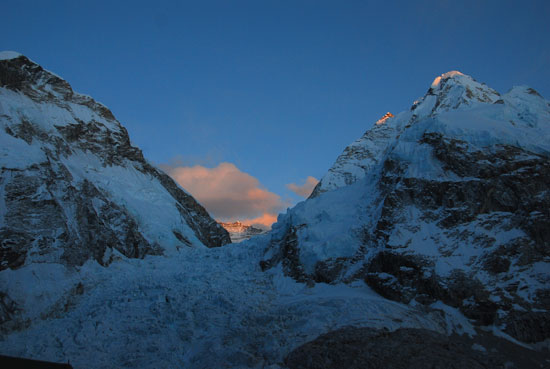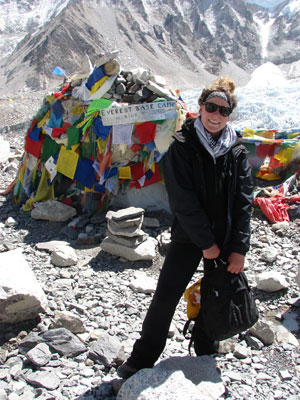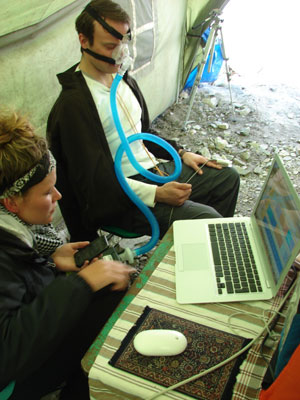 |
| Night falls on Everest. (Photo courtesy Heather McGuire) |
As her peers in political science were crossing the stage at convocation this year, Heather McGuire was on the other side of the world, camping on a glacier at the base of Mount Everest.
“It’s like the dark side of the moon, with a mix of suburban wasteland,” says Ms. McGuire, now back in Halifax. “It’s a spotted glacier, filled with orange, green and yellow tents. People there are essentially waiting for this weather window to climb, this tiny little fraction between monsoon season and winter. So it’s really only a few weeks in May that hundreds of climbers go and sit at base camp for a month, waiting for the perfect time to climb.”
 |
| Poli-sci grad Heather McGuire joined her father at the Everest base camp. (Photo courtesy of Heather McGuire) |
Though she regretted missing convocation, she didn’t hesitate when her father – a medical doctor based in Saudi Arabia – asked her to join him on an expedition to the Everest base camp on the Nepal side of the mountain. They were there to test airway pressure machines and their effects on climbers and hikers.
“We were seeing if the machines would help with altitude sickness, oxygen saturation and the general effects of working in such high altitudes,” she explains. The devices – each no bigger than a shoebox – use a nasal mask to apply pressure to the lungs to inflate them, which can be helpful when working in locations like Everest base camp,17,000 feet above sea level.
“You’re moving oxygen at twice the amount you would be at sea level, and there’s half the air available for you to breathe,” she says. “So just simple tasks end up being quite tedious – even just walking around.”
And then there was the matter of adjusting to the climate.
“During the day I could be sitting outside in a tank top, and by the time the sun was gone behind the mountains I’d be in a Canada Goose parka, freezing. It was kind of a joke on the mountain that you’d get all the seasons in a day.”
 |
| Conducting tests on climbers. (Photo courtesy of Heather McGuire) |
The father-daughter team ran tests on 41 hikers and climbers during their seven days at base camp. Even though they weren’t climbing up the mountain itself, just making it to base camp isn’t easy: it took them seven days and required the assistance of 15 hired porters to carry all their medical equipment for the experiments. The return trip was much easier – only four days.
“It’s very euphoric. You feel like you’ve just been on top of the world, and you forget about all the pain and suffering of getting up the mountain in the first place. You feel so chuffed about the personal experience.”
Ms. McGuire is planning to start her Bachelor of Journalism degree at Kings this fall, but says she’s glad that she took the time for one last adventure before finishing her undergrad.
“I saw this as a challenge,” she adds. “Coming to the end of my university career, I wanted one last push to really feel like I’d accomplished something personally.”
Comments
comments powered by Disqus
